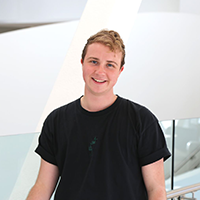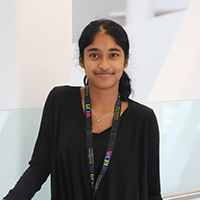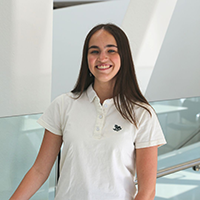This summer, WCH welcomed 21 students to participate in our Summer Student Research Opportunities as part of the Emily Stowe Scholars Program (ESSP). The ESSP works to establish relationships that support, mentor and advance the wholistic development of diverse persons who have been systemically and historically excluded in health care and health science career trajectories.
These students participated in important research across several health spaces including, but not limited to, familial breast cancer, digital health solutions and systems, and trauma therapy.
Get to know a few of these students and their plans for the future!

Brennan Snow
Researcher/Supervisor: Dr. Kathleen Armstrong
Area of Research: Transition Related Surgery
What sparked your interest in healthcare and health sciences?
I remember being interested in healthcare from a young age, and while I always thought I would go directly into health sciences, I ended up taking a bit of an unexpected path to get here – first with an undergraduate degree in human geography, and in a Master of Social Work. In the last couple of years of my undergraduate degree, I took several health geography focused courses, as well as courses focused on sexuality, gender, and health. This coincided with me beginning to get more involved in trans and queer community work and health research, and everything sort of fell into place, reigniting an interest in social determinants of health, sparking a particular interest in trans healthcare, and prompting me to specialize in mental health and health in my social work program.
What interests you most about the area of research that you’re working in?
This summer, I’m working on an environmental scan of gender affirming surgery policy coverage in Canada. My own experiences as a trans person accessing care, as well as experiences volunteering and working within trans and queer communities have made apparent to me the challenges that exist when accessing transition related health care. These are what drive my passion and interest in the work. When it comes to the environmental scan, I love that it is something that feels tangible, and can have a direct impact by working in collaboration with community organizations to demystify access to this essential care for those in trans and gender diverse communities, but also to highlight areas for advocacy and policy change on a more structural level.
Where do you see yourself in 5 years?
I have another year left in my program (and another whole practicum!) so I’m trying to stay open to possibilities, but I know that I want to be working in 2SLGBTQ+ health, ideally with a balance of direct (more clinical) and indirect work (whether that be in research or policy).
How do you think the ESSP will help you in your future career path?
ESSP has given me the opportunity to gain hands-on research skills across the research process, as well as access to networking with, and mentorship from, clinicians and researchers who are already doing the kinds of work that I am interested in. I’ve had the opportunity to focus in on an area of research that I know I’m passionate about and interested in, but also the opportunity to learn more broadly about the research being done at WCH, as well as explore what clinical practice looks like in this setting through shadowing opportunities. I think all of these skills, experiences, and connections will shape my path moving forward.

Sruti Prabakaran
Researcher/Supervisor: Dr. Kelly Metcalfe (supervised by Ms. Ellen MacDougall)
Area of Research: Familial Breast Cancer
What sparked your interest in healthcare and health sciences?
I found it absorbing how intricate healthcare and health sciences are and the variety of different careers they involve. It is exciting to think about the multitude of different job profiles in these fields and the many more that will be invented in the future. These challenging, complex fields seem to contain a host of pathways to explore, which is why I am interested in these fields.
What interests you most about the area of research that you’re working in?
Familial breast cancer studies the genes that cause hereditary breast cancer when they undergo mutations, such as BRCA1&2. The increase in risk as a cause of these mutations was fascinating to learn about. What I enjoyed even more was the different methods of studying these risk factors, from blood & tumor samples to questionnaires & clinical information. I loved applying this knowledge by working in a research laboratory to prepare kits to collect these samples. Overall, I enjoyed exploring the genetics of this project immensely!
Where do you see yourself in 5 years?
In 5 years, I see myself pursuing graduate studies in research. I aspire to travel internationally and complete research investigating disadvantaged populations so that I can use my research to improve their quality of lives. Dr. Rulan Parekh, who has completed studies in sub-Saharan Africa for HIV infected individuals with chronic kidney disease, continues to be a role model for me to explore these fascinating pathways and aid disadvantaged populations through the research field.
How do you think the ESSP will help you in your future career path?
The Emily Stowe Scholar Program has revealed to me an abundance of different fields to investigate in research. Although I was previously unsure about pursuing a Masters or a PHD in research, the ESSP provided me with a better understanding of the opportunities that exist and the research pathways that can be explored. It has also augmented my passion for research. I came into the program with a very basic understanding of what research is. However, within the duration of this program, I have met many different types of people from a variety of professions such as clinician scientists, genetic counselors and principal investigators that I am eager to further explore the gripping field of research, thereby contributing to my choice of pursuing further studies in researching disadvantaged populations.

Maia Kelly
Researcher/Supervisor: Dr. Suvendrini Lena and Dr. Candice Todd
Area of Research: Indigenous Health/Neurology
What sparked your interest in healthcare and health sciences?
From my early years in school, I have always been fascinated with human health and disease. Throughout my studies, and especially during the pandemic, my interests in health sciences have only grown, ranging from broad issues in global health and disease all the way molecular host-pathogen interactions. But as I’ve developed these curiosities, what has really grabbed my attention are the vast inequities that exist within the field and its real-world translation, as systemic barriers continue to govern individual capacities to lead healthy lives, receive adequate care, and participate fairly in health systems. As such, through public health and health science research, I hope to one day become part of the global thrust in healthcare advocacy, as well as in efforts to build more equitable and representative research spaces.
What interests you most about the area of research that you’re working in?
What interests me the most about the about Indigenous health research is that there is always something to learn and someone to learn from. Working in this research area constantly exposes me to new knowledge systems and ways of thinking, as every project requires its own lens and toolkit with which to approach to it.
Where do you see yourself in 5 years?
It’s hard to say where exactly I see myself in 5 years, as I still have significant learning and change ahead of me. However, as I am currently planning on pursuing a Master’s following the completion of my undergraduate studies, in 5 years I see myself having finished a postgraduate degree in a public health and/or epidemiology-related program, and beginning the next step in my career journey. Whether this be through pursuing further education or gaining experience in a more formal job setting, I hope to have the opportunity to travel and experience living abroad during these years, where I can begin building international connections and exploring new pathways.
How do you think the ESSP will help you in your future career path?
Coming into the ESSP at the beginning of the summer, I had a much narrower view of the health sciences field. When it came to pursuing a career in this space, I carried a preconceived notion that career paths were relatively pre-determined, in the sense that there was pressure to decide early on whether I would want to pursue academia or research versus a more clinical route. It was through ESSP-facilitated conversations with researchers and physicians this summer that my perspective completely shifted. Hearing about the diverse paths undertaken by WCH scientists, as well the collaborative work taking place at the hospital, I quickly came to see the creativity and opportunity for interdisciplinary work that exists in health sciences. Thus, in addition to equipping me with fundamental research skills, the Emily Stowe summer program has taught me to always keep an open mind and explore new opportunities as I navigate my next steps, even those that are unexpected.
To get to know some of the other students who participated in this year’s opportunities, visit the Emily Stowe Scholars Program webpage.